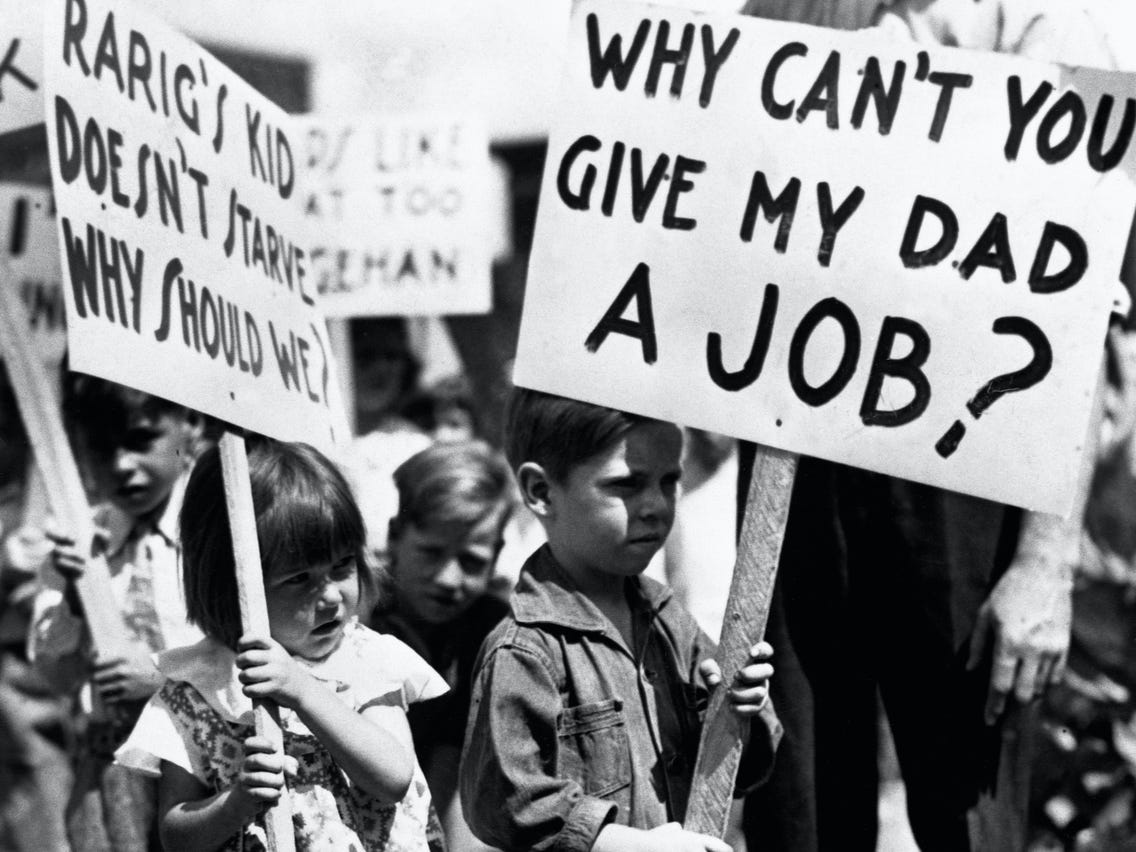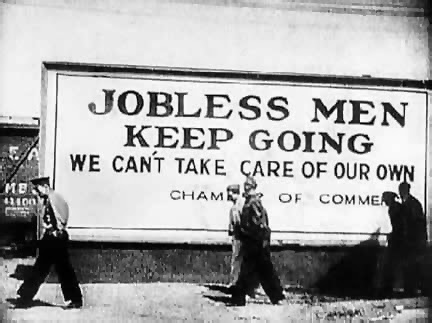 The picture above shows how dire the situation was in America during the Great DepressionImage Source
The picture above shows how dire the situation was in America during the Great DepressionImage Source
Source 2A
The source below describes the impact of the Great Depression on men in the USA.
Source 2A
The stress of financial strain took a psychological toll- especially on men who were suddenly unable to provide for their families. The national suicide rate rose to an all- time high in 1933.
Marriages became strained, though many couples could not afford to separate. Divorce rates dropped during the 1930s though abandonments increased. Some men deserted their families out of embarrassment or frustration. This was sometimes called a ‘poor man’s divorce’.
It is estimated that more than two million men and women became travelling hobos.
Many of these were teens who felt they had become a burden on their families and left
home in search of work. It was worse with men as head of the families because they
could not put something on the table.
Riding the rails – illegally hopping on freight trains – became a common, yet dangerous
way to travel. Those travelling the country in search of work often camped in
‘Hoovervilles’, shantytowns named after Herbert Hoover, president during the early
years of the Great Depression.
[From www.history.com/ Accessed on 10 April 2021]
2.1.1 What is your understanding of the concept Great Depression? (1x2)(2)
- Refers to the consequences of the stock market crash in America; or
- Period of economic decline and poverty due to the stock market crash of 1929; or
- Any other relevant answer
2.1.2 Quote evidence from the source that suggests that men killed themselves because of their inability to provide for their families.(1x2)(2)
- The national suicide rate rose to an all-round high in 1933
2.1.3 Why, according to the source, did men desert their families? (1x2)(2)
- Because of embarrassment or frustration
2.1.4 Use the information in the source and your own knowledge to explain why two million men and women became travelling hobos. (2x2) (4)
- Many men and women were unemployed, and they went to search for jobs elsewhere; or
- Many men and women lost their homes and were looking for shelter elsewhere; or
- They were looking for food and other relevant materials; or
- Any other relevant answer
2.1.5 Explain how the Great Depression led to the formation of Hooverville. (2x2) (4)
- Many families lost their homes; or
- Banks took down homes and many families became homeless; or
- People built warehouses from waste materials; or
- President Hoover failed to provide the people with proper housing and infrastructure; or
- Any other relevant answer
2.2 Refer to source 2B
The source below is an extract from an interview with Maya Angelou, conducted by Blackside, Inc. on April 11, 1992. Maya Angelou (historian and civil rights leader) describes the impact of the Great Depression on Black communities in the USA.
Source 2B
... They said in the South that “the Depression had been going on for ten years before black people even knew about it,” even knew it existed, and that was true particularly in the South, in villages, and small hamlets, and small towns because the people lived at a subsistence level for the most part. Many were sharecroppers ... they owed their lives to the company store. So because they hadn’t been able to get education, they were vulnerable to the greed and evil of the farm owners. So at the end of the year the farmer found himself in debt. So, the Depression had gone on long before the crash of ‘29 took place. One of the ways it affected the black community was that the white hobos (travellers) would come to the black area to ask for food. Now, partly out of pride, and maybe the other part out of an ability to identify, to empathise with the hobo, black people always gave food. Now they had beans, maybe, with a little piece of smoked meat or dried meat, cured meat, they had cornbread, and black people would give beans and cornbread to black hobos.
[From http://digital.wustl.edu Accessed on 10 April 2021.]
2.2.1 Quote evidence from the source that suggests that Black Americans were unaware of the Great Depression. (1x2)(2)
- ‘… the Depression had gone on long before the crash of ‘29 took place’
2.2.2 What type of work, according to the source, were Black Americans doing in the South? (1x2)(2)
- Sharecropping or subsistence farming
2.2.3 Explain what Angelou meant with the statement, ‘The Depression had gone on long before the crash of 29 took place’. (1x2)(2)
- Black people lived in poverty before the outbreak of the Depression; or
- The effect of the Great Depression on White Americans has long been experienced by Black Americans; or
- Any other relevant answer
2.2.4Use the information in the source and your own knowledge to explain how Black Americans reacted towards white hobos who entered their area. (2x2) (4)
- They accepted the Whites; or
- They were sympathetic to white hobos; or
- They provided White hobos with food; or
- Any other relevant answer
2.2.5 Explain the usefulness of this source for historians researching the effect of the Great Depression on Black people in America in the 1930s. (1x2)(2)
- This is an excerpt from an interview – first-hand information; or
- Angelou was a Civil Rights Leader who understood the struggles of Black people; or
- Angelou, herself was black and has experienced poverty; or
- Angelou’s experiences gives an informed version of the subject; or
- The source shows that Black people have lived in poverty and misery for a long time before the Depression broke out; or
- Any other relevant answer
2.3 Consult Source 2C
The source below is a letter from a delegation of the Unemployed Councils of Alabama, to Governor Benjamin Miller and the state legislature (1931) representing all the cities. It describes the living conditions of the people and it gives a list of demands for unemployment relief.
Source 2C
At the same time that the state legislature (parliament) is in a special session, there exists widespread unemployment and great misery amongst the people of Alabama. The relief being afforded by the Red Cross is entirely inadequate and is nothing but a slow process of starvation. The various self-help schemes in the cities are plans to keep the unemployed on a permanent pauper (bankrupt) level. The conditions of the unemployed is getting worse, unemployment is increasing and the question of immediate relief is the foremost issue confronting the thousands of the unemployed and their families. The special session is not attempting to meet this need... All the so called economy measures are attempts to lower the living standard of the people. In answer to these conditions, we have been elected as a delegation to present the following demands for immediate unemployment relief which we believe should take precedence over all questions before the legislature. $3 cash weekly relief for the average family... Free utilities**(gas, light, water) and rent for all unemployed and part-time workers earning less than $7 a week. Adequate care for homeless, young and single workers Provision for opening of all schools, payment of salaries to teachers and free lunches and books for school children Right to vote for all unemployed without payment of poll tax. [From https://digital.archives.alabama.gov Accessed on 11 April 2021]
2.3.1 Name the organisation that brought relief to the people of Alabama. (1x1) (1)
- Red Cross
2.3.2 What conclusion can be drawn about the Alabama legislature’s attitude towards the needs of their people? (1x2)(2)
- They did not care for their subjects; or
- The legislature’s plans were out of touch with the needs of their people; or
- The legislature did not consult the people regarding the lighting programs
2.3.3 Write down THREE demands which were suggested by the delegation to better the lives of the citizens of Alabama. (3 x 1) (3)
- $3 cash weekly relief for the average family...
- Free utilities**(gas, light, water) and rent for all unemployed and part-time workers
earning less than $7 a week. - Adequate care for homeless, young and single workers
2.3.4 Combining the evidence and information from the source together with your knowledge, explain the effects that the Great Depression had on education in Alabama. (2 x 2) (4)
- Schools were closed down
- Teachers were not getting paid their salaries
2.3.5 How reliable is the source for historians researching the effect of the Great Depression on the citizens of Alabama. (1 x 2) (2)
- The source is reliable as it shows both the economic and social impacts of the Great Depression on the citizens of Alabama.
2.4 Consult Source 2D.
Source 2D

From http://causesofthegreatdepressionfranklind.blogspot.com/2015/02/jobless-men-keep-going.htmlAccessed on 10 April 2021
2.4.1 What can be learnt about the impact of the Great Depression on the people of the US? Make use of visual clues from the source to back your answer. (2 x 2) (4)
- There were many jobs lost
- Men in particular were affected by the lack of jobs and felt helpless.
2.4.2 Using this source with your own knowledge, explain how an American without a job would have felt after viewing this picture. (1 x 2) (2)
- They would feel hopeless.
2.5 Combining your own knowledge with the relevant sources, write a paragraph of approximately SIX lines (+-60 words) explaining the impact of the Great Depression on the lives of US citizens in the 1930s. (6)
Americans lost their jobs during the great depression. Teachers were not getting paid and school closed down during the Great Depression. As a result of the Great Depression and the psychological strain of it, suicide rated increased while marriages were broken as a result of men abandoning their families out of shame of being unable to provide. Hopping on freight trains illegally became a norm despite how dangerous it was.
[50]
This content was originally produced for the SAHO classroom by
Sebastian Moronell, Ayabulela Ntwakumba, Simone van der Colff & Thandile Xesi.